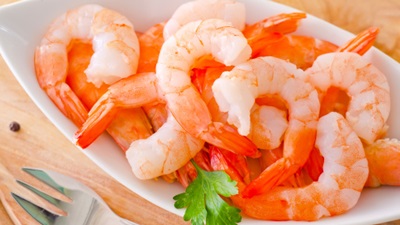
There has been some confusion regarding certain foods and their desirability from a health perspective. Recently, we commented upon the consumption of eggs and tried to dispel some misunderstandings. This week, one of our readers asked our Food Expert if shrimp is healthy or not—let me dispel the myth.
For a long while now, shrimp has been somewhat shunned as a dietary choice because it was known that shrimp contained a great deal of cholesterol by weight relative to other foods. It was also advised that foods containing higher amounts of cholesterol should be avoided because consuming them would increase blood cholesterol levels leading to the development of cardiovascular disease.
Well, let’s look at the evidence before condemning these tasty creatures. Firstly, approximately 50% of people who are diagnosed with atherosclerosis have normal blood cholesterol. Secondly, although increased cholesterol levels are a risk for heart disease and stroke, it’s the relative levels of LDL (bad cholesterol) and HDL (good cholesterol) in your blood that can signify the significance of risk. Consuming foods with higher amounts of cholesterol will not significantly increase LDL levels or decrease HDL levels in your blood. Thirdly, dangerous elevations of LDL cholesterol are much more sensitive to the consumption of saturated fat, calories, and sugar.
When you eat lard, full fat dairy, butter, red meats, deli meats, fried foods, sugar, and refined carbohydrates, your liver produces more LDL cholesterol, and as insulin levels increase after a meal, so does the production of LDL cholesterol and triglycerides from the liver. The production of the helpful HDL cholesterol also decreases.
Consuming shrimp will not influence the risk profile because shrimp is quite low in saturated fat. Let’s look at the nutritional breakdown.
What’s really in shrimp
In a one pound serving of shrimp, you will get 481 calories (15 % fat, 4% carbohydrates, 81% protein), 689 mg of cholesterol, 671 mg of sodium, 839 mg of potassium, 7.85 gm of fat, 4.13 gm of carbohydrates, and 92.13 gm of protein.
Most of the fat in shrimp is polyunsaturated or monounsaturated fat as this serving size of shrimp only contains .092 grams of saturated fat! Despite the fact that shrimp contains high amounts of cholesterol by weight, shrimp also contains high amounts of the omega-3 fatty acids which can actually lower high blood levels of LDL cholesterol.
Why shrimp is healthy
Shrimp is low in calories, total fat, saturated fat, and high in healthy omega-3 fats and protein. Consuming shrimp is also a great way to get ample amounts of selenium, zinc, iron, and vitamin B12.
The real problem begins when you fry shrimp or have it prepared breaded or drenched with a rich sauce. Shrimp can be consumed in moderation and the best way to prepare it is grilling, broiling, or boiling.
One of my favorite foods is grilled garlic shrimp. I just buy raw shrimp, place it on the BBQ, and brush it with extra virgin olive oil and garlic. It takes approximately 20 minutes to cook and the taste is quite wonderful.
In my opinion, it’s not a problem to eat shrimp. Enjoy them in moderation!
Sources:
“Dietary supplements face sheets,” Office of Dietary Supplements web site; http://ods.od.nih.gov/factsheets/list-all/, last accessed Sept 9, 2013.
“An Important Message about Shrimp,” The World’s Healthiest Foods web site; http://www.whfoods.com/genpage.php?tname=foodspice&dbid=107, last accessed Sept 9, 2013.
“Shrimp,” Fatsecret web site; http://www.fatsecret.com/calories-nutrition/usda/shrimp?portionid=37350&portionamount=4.000, last accessed Sept 9, 2013.













